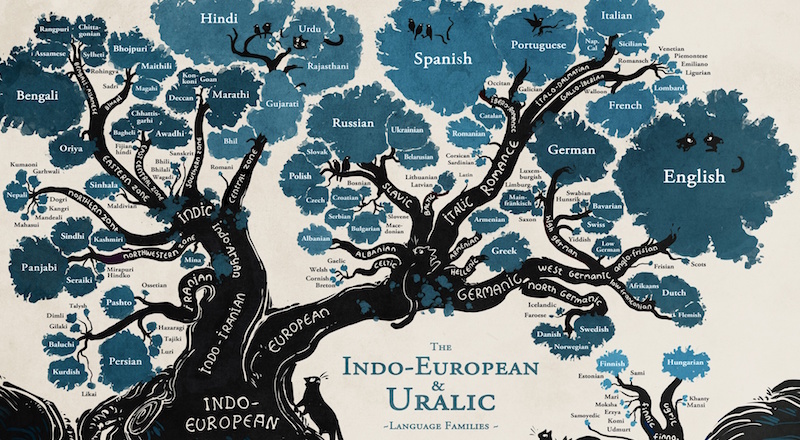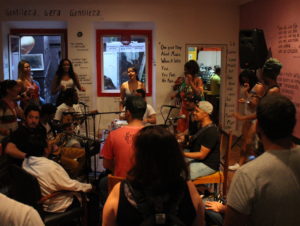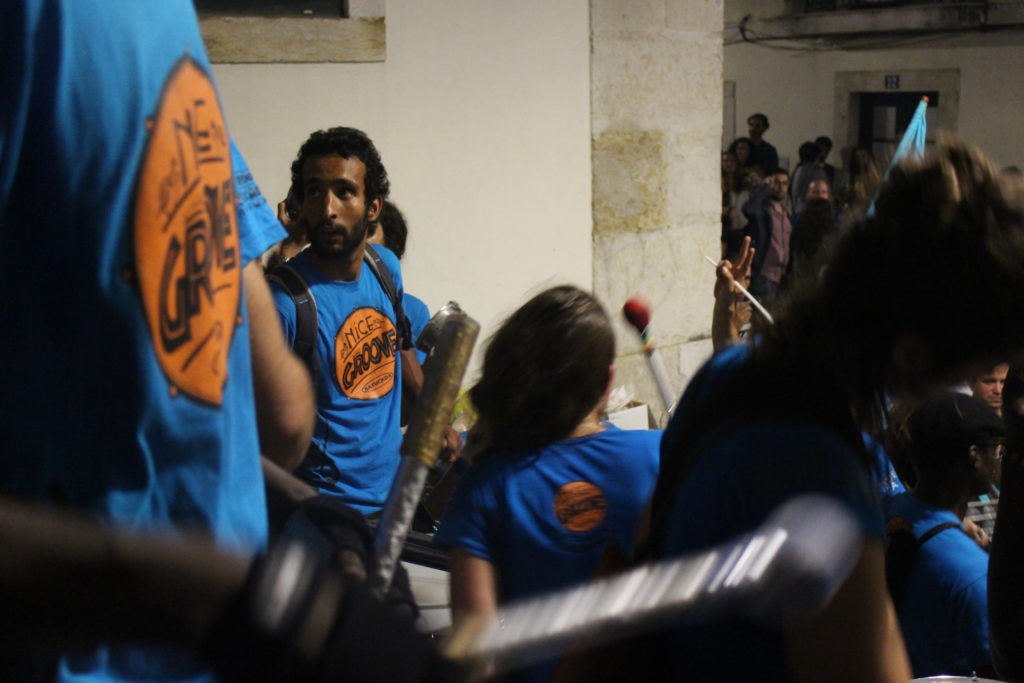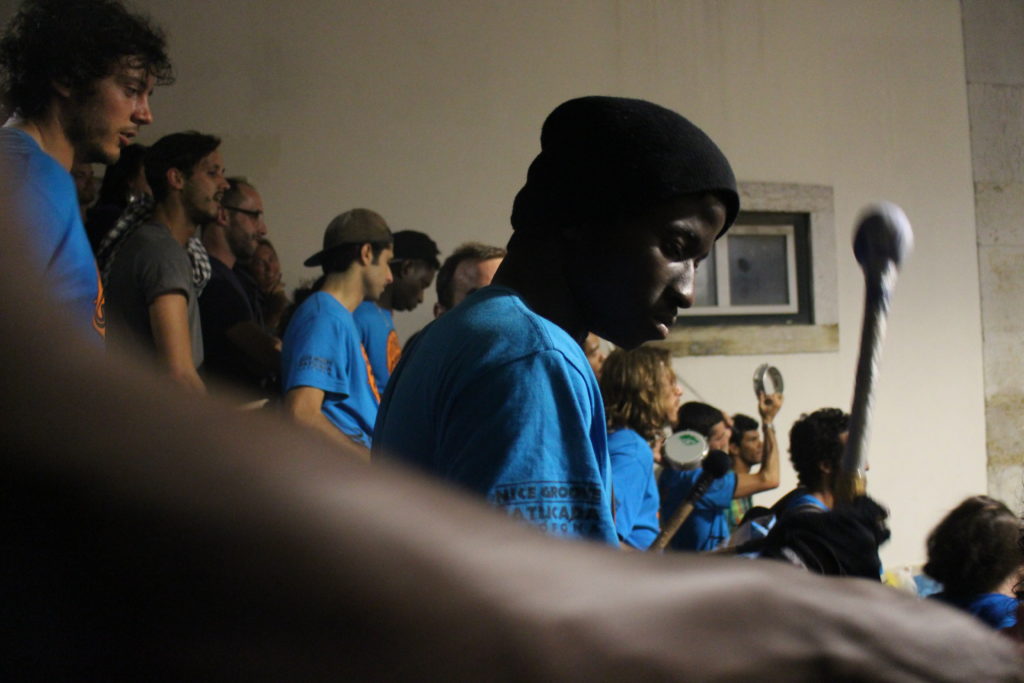SOCIOCULTURAL LINGUISTICS: A WORLD SHAPED BY LANGUAGES

I’m one of those people who believe that language, whether written or sign language, shapes our world. Our mother tongue gives us the basis to our thinking and after that, additional learnt languages expand our worldview. In scientific terms this is called linguistic relativity or Sapir–Whorf hypothesis. The discipline which studies this phenomenon is called sociology of language, and the discipline which studies society’s effect on language is called sociolinguistics. I like to simplify things and speak about sociocultural linguistics.
Imagine being born in a culture with no gender for words (e.g. Finnish). To you, all things and phenomena around you are neither female or male, and that’s why you’ll also occasionally confuse, say, ‘him’ and ‘her’ when speaking English. Now imagine being born in a culture where language has two genders (e.g. Italian). If you ask an Italian whether the moon is male or female (not the word but the planet), they will answer: “female” (‘la luna’) and if you ask a German the same question, the answer will be: “male” (‘der Mond’). The explanation? The genders the language uses. (Oh, and by the way, German has one gender more.). Thus, the key to fully understanding people from a specific culture: understanding their language.
The meaning of language in influencing intercultural exchange and power structures is huge. As a Finn, when you leave your country borders, you also leave your linguistic surroundings behind. There’s no other country where Finnish is officially spoken and there’s no other culture that us Finns would be tied to through our native language. The sunny side of this? You always have a secret language and a big motivation to learn new ones if you wish discover cultures through speaking with natives.
Case: Lusophones in Europe
 While shooting a documentary on associations in Europe which promote the Lusophone (Portuguese speaking) cultures in the World (Brazil, Portugal, Angola, Mozambique, Cape Verde, Guinea-Bissau, Saõ Tome and Principe, Macau and East Timor), I was struck by the fact that Portuguese is officially spoken on four continents (French is spoken on five, no comments on colonialism here, I’m purely speaking about the present linguistic reality) and is the 6th most spoken language in the world. All through Europe there are people from the previously mentioned countries who thrive to promote Lusophone cultures, and those are the people we interviewed. The interviewees went from a Cap Verdean culture center owner to a Portuguese Kindergarten and to Saõ Tomean writers, to name but a few. What they all emphasized was the power of language in building identity and uniting, as well as separating. For example, in a capoeira class, the students weren’t allowed to speak any other language than Portuguese, so that others wouldn’t feel left out.
While shooting a documentary on associations in Europe which promote the Lusophone (Portuguese speaking) cultures in the World (Brazil, Portugal, Angola, Mozambique, Cape Verde, Guinea-Bissau, Saõ Tome and Principe, Macau and East Timor), I was struck by the fact that Portuguese is officially spoken on four continents (French is spoken on five, no comments on colonialism here, I’m purely speaking about the present linguistic reality) and is the 6th most spoken language in the world. All through Europe there are people from the previously mentioned countries who thrive to promote Lusophone cultures, and those are the people we interviewed. The interviewees went from a Cap Verdean culture center owner to a Portuguese Kindergarten and to Saõ Tomean writers, to name but a few. What they all emphasized was the power of language in building identity and uniting, as well as separating. For example, in a capoeira class, the students weren’t allowed to speak any other language than Portuguese, so that others wouldn’t feel left out.
The beauty of Lusophone bonds is in the exchange of cultural heritage, which runs through music, dance, food, attitude. This observation refers mainly to African and South American influences in Europe, not vice versa, as I find it difficult to analyze the influence of European cultures elsewhere (such a double-ended sword). This mixture of cultures is most obvious and visible in Lisbon where there are samba, forró (Brazilian dances) and kizomba (Angolan dance spreading in Europe like the pest) parties going on every night and where international batucadas (percussion groups) like NICE Groove play rhythms from all Lusophone countries with people from those countries. Although there are cultural differences, the language unites. But Portugal is not the only place in Europe were Portuguese is widely spoken. Did you know, for example, that a 5th (yes, 20%) of Luxembourgians are Portuguese speaking? Or that big Portuguese speaking minorities also exist in France, Italy, Slovenia, Austria and Sweden?
Strangerless comments: languages rule!
The Austrian philosopher Ludwig Wittgenstein argued that language is reality. Of course, non-verbal communication also exists and can make you understand the present, but language serves as a key to the past and future. Thus, when people say traveling widens your horizons, I say learn languages to expand your universe and magnify your potential as human being!





















Hep! I agree that different languages make your brain work in different ways, but I’m not convinced that the gender-in-language thing is that significant. Swedish has linguistic gender too for nouns (-n and -t words) but they don’t have anything to do with male or female. Swedish does, however, have he and she. There’s a debate about getting rid of the gendered personal nouns on the grounds that it would decrease sexism. But although Finnish doesn’t have gendered pronouns, we’re no less sexist than the Swedes. And Swahili (and probably other Bantu languages too) has sixteen genders for their nouns… it was a bitch to learn… but they aren’t linked to male or female either… how does that affect your brain?
I speak a few languages and what happens is that when I hear certain words in language X, I might get “echoes” from words that sound similar in languages Y or Z. For example I’ve never liked the English word “frock” for dress because it sounds like Swedish “rock”, overcoat, and I imagine a stiff buttoned-up garment, no fun at all. I’ve never used the word “frock”. Well, also it sounds really stuck-up and old-fashioned.
Dear Linda,
Thanks for your thoughts! I’m happy to read that I’m not thinking about these issues alone 🙂 It seems to me that you as well love languages and the worlds that open behind and through them. Your note surely opens up a super interesting topic on linguistic genders, which, in this post, I wasn’t (yet) meaning to address. Maybe one day in the future?
I’m by no means an expert on all languages and cultures of the world. You can’t know them all and I believe it’s not even necessary for understanding that cultures are different and people think differently (this is my very cultural relativist opinion :)). What I want to avoid is putting an artificial hierarchy on cultures and languages. They’re all good just as they are, I just like to observe the differences. Why? Because I believe when you don’t see the differences you can’t try to understand them.
In this post, I mention the him/her separation solely to give a specific example on how the lack of expressions in your own language can cause you to make mistakes in another. I didn’t in any way mean one language being better than the other, or languages creating a less or more sexist way of thinking (in which my opinion is quite similar to yours). The examples I give are there to give an idea on how I believe languages shape our thinking. But just as examples per se, without referring to one being better than the other.
What I do find fascinating, though, is that the prepositions of words make people think as objects as male or female. This is not only my own observation, but the results of a test I’ve done in the past with my Italian and German speaking friends. Historically Swedish, just like German, used to have three genders, which were male, female and neutrum. These genders have later merged into the ones of today’s Swedish. Yet, this is just a detail which in my own opinion has nothing to do with a language being sexist or not (some would argue the opposite). By the way, isn’t it funny that in German the word for ‘a girl’ is neutral (DAS Mädchen)?!?
As to our question about the 16 genders you mention Swahili has: that’s suuuuper fascinating! I really don’t know the answer (but man, would I wish I did!)!! And I definitely have no idea how Hindi, Arabic, Bitonga etc. make you think. But what I believe is that languages DO make you think differently. My personal experience on this is still very limited, as all the languages I speak in addition to Finnish are indo-european (English, Italian, Polish, German, Spanish and Swedish), unlike you, who is lucky to have the ability to speak a bantu language. One day, I would love to know more, how it has affected your vision of the world (has it?). My dream is to learn Arabic, but until that happens, let’s try to manage with a crappy Portuguese in Brazil (which is where I am now)…
All the best and thanks for your thoughts, emotions and ideas.
Sissi
9/6/2016 Appreciate strangerless.com– very user-friendly and lots to consider!
Hi Stefanie! Thanks!! Glad you like it and hope you’ll enjoy it also in the future!